
This comprehensive course is designed to equip aspiring engineers with the essential knowledge and skills required to successfully pass the FE Engineering Exam. Covering fundamental engineering principles across various disciplines, this course will guide you through concepts, problem-solving techniques, and exam strategies necessary for success.
Course Levels
-
Level 1: Introduction to Engineering Principles
This level provides an overview of essential engineering principles and basic mathematics. It sets the foundation for more complex topics in engineering.
-
Level 2: Statics and Dynamics
This level delves into the principles of statics and dynamics, focusing on forces, moments, and the motion of bodies.
-
Level 3: Fluid Mechanics and Thermodynamics
In this level, students will explore the properties of fluids and the principles of thermodynamics, essential for understanding systems in engineering.
-
Level 4: Materials Science and Engineering
This level addresses the fundamentals of materials science, focusing on the properties, behaviors, and applications of various engineering materials.
-
Level 5: Electrical and Electronics Engineering
This level introduces basic concepts in electrical engineering and circuits, including analysis and design principles.
-
Level 6: Structural Analysis and Design
This level covers the fundamentals of structural analysis and design procedures essential for civil engineering applications.
-
Level 7: Project Management and Professional Practice
This level introduces key concepts in project management and professional practices relevant to engineering projects.
-
Level 8: Review and Practice Exams
In this final level, students will review all topics covered and take practice exams to assess their understanding and readiness for the FE Exam.
Course Topics
-
Topic 5: Applications of Thermodynamics
# Applications of Thermodynamics Thermodynamics is a branch of physics that deals with heat, work, and energy transformations. It plays a crucial role in various engineering applications, particularl...
-
Topic 1: Engineering Ethics
# Engineering Ethics Engineering ethics is a crucial aspect of the profession that governs the moral principles and standards that engineers must adhere to in their work. This topic covers the import...
-
Topic 5: Final Exam Preparation Tips
# Final Exam Preparation Tips Preparing for the Fundamentals of Engineering (FE) exam can be a daunting task, especially as the exam date approaches. However, with effective strategies and structured...
-
Topic 2: Fluid Dynamics
# Fluid Dynamics Fluid Dynamics is a sub-discipline of fluid mechanics that studies the behavior of fluids (liquids and gases) in motion. Understanding fluid dynamics is crucial for engineers and sci...
-
Topic 3: Engineering Economy
# Engineering Economy Engineering Economy is a crucial subject in the field of engineering that deals with the evaluation of the economic feasibility of engineering projects. It involves the analysis...
-
Topic 1: Material Properties
# Material Properties Material properties are the characteristics of materials that define their behavior under various conditions. Understanding these properties is critical for selecting the right ...
-
Topic 1: Comprehensive Topic Review
# Comprehensive Topic Review In this section, we will conduct a thorough review of the key concepts and principles essential for the Fundamentals of Engineering (FE) Exam. This comprehensive topic re...
-
Topic 4: Stability and Deflection
# Stability and Deflection ## Introduction Stability and deflection are critical concepts in structural analysis that ensure structures can withstand applied loads without undergoing undesirable defo...
-
Topic 1: Project Lifecycle
# Understanding the Project Lifecycle The project lifecycle is a crucial element in project management that defines the stages a project goes through from initiation to closure. Understanding these s...
-
Topic 5: Signal Processing Basics
# Signal Processing Basics Signal processing is a crucial area in electrical and electronics engineering that deals with the analysis, interpretation, and manipulation of signals. Signals can be in t...
-
Topic 5: Work and Energy Principles
# Work and Energy Principles In the study of mechanics, understanding the principles of work and energy is crucial for analyzing the motion of bodies and the forces acting upon them. This section del...
-
Topic 2: Moments and Couples
# Moments and Couples In engineering mechanics, understanding moments and couples is crucial for analyzing static and dynamic systems. This topic dives into the concepts of moments, how they are calc...
-
Topic 4: Newton's Laws of Motion
# Newton's Laws of Motion Newton's Laws of Motion are three physical laws that form the foundation for classical mechanics. They describe the relationship between a body and the forces acting upon it...
-
Topic 3: Practice Exam 2
# Practice Exam 2 ## Overview This practice exam is designed to help you prepare for the Fundamentals of Engineering (FE) exam by providing a comprehensive review of key concepts and problem-solving ...
-
Topic 4: Heat Transfer Mechanisms
# Heat Transfer Mechanisms Heat transfer is a fundamental concept in thermodynamics and fluid mechanics. It refers to the movement of thermal energy from one physical system to another, usually as a ...
-
Topic 2: Practice Exam 1
# Practice Exam 1 ## Overview The purpose of this practice exam is to provide you with an opportunity to assess your understanding of the key concepts and problem-solving skills covered in the Fundam...
-
Topic 4: Material Selection Criteria
# Material Selection Criteria When it comes to engineering and design, selecting the right material is crucial for the success of any project. The choice of material can significantly impact performa...
-
Topic 4: Test-Taking Strategies
# Test-Taking Strategies Preparing for the Fundamentals of Engineering (FE) Exam requires not only knowledge of engineering principles but also effective test-taking strategies. Here are several tech...
-
Topic 4: Cost Estimation
# Cost Estimation Cost estimation is a critical component of project management, particularly in the engineering domain. It involves predicting the financial resources required to complete a project ...
-
Topic 1: Equilibrium of Forces
# Equilibrium of Forces ## Introduction In the study of statics, understanding the equilibrium of forces is fundamental. Equilibrium occurs when the net force acting on an object is zero, meaning tha...
- And 19 more topics...